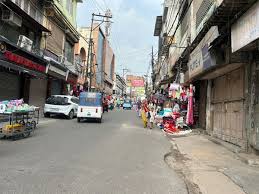
After days of heightened tensions along the India-Pakistan border, a sense of cautious optimism has begun to emerge in Jammu. As the ceasefire agreement brought brief relief, some shops in City Chowk, a prominent market area, cautiously reopened on Sunday. However, many remained closed as business owners and workers weighed the uncertainty of the situation and the challenges brought on by the ongoing conflict.
The streets of City Chowk saw the first signs of business returning to normalcy, but only a few establishments resumed operations, while others remained shut. Among the few who reopened their shops was Tarsem Lal Gupta, who runs a bag shop in the area. Gupta, who had been closed for two days, expressed that while the relative calm encouraged him to open, business activity was still at a standstill. “There is no customer, no work. It’s been one week since operations halted. Hoping things will improve in the future,” Gupta said, noting that the market had yet to see a significant influx of customers.
Despite the ceasefire bringing a temporary sense of relief, many shop owners continued to face difficulties. “The labour is not local, and out of fear, they did not show up for work,” Gupta explained. “Now, the shop owners have no choice but to operate alone. Many shops remain closed due to a lack of support staff.”
Other residents in the area voiced similar concerns over the economic hardship caused by the prolonged tension. Sikander, a hawker in City Chowk, spoke about the difficulties faced by those living on daily wages. “It’s very tough for the poor. On Sundays, we usually make enough to cover expenses for the whole week, but today, we haven’t made anything,” Sikander said, adding that the situation was dire for many families. “We have children to take care of, and without daily earnings, it’s very hard to make ends meet.”
Sunny Ganotra, an auto-rickshaw driver, also shared how the situation had disrupted his livelihood. “No one is going out. People are scared, and there’s no work,” he said. “The poor and working-class people depend on their daily earnings to feed their families. We can only survive if we make money every day.”
Ganotra described his family’s struggles, including the medical expenses of caring for his paralysed mother and ill father. “I’ve earned 80 rupees today, out of which 10 rupees went for tea. So I’m left with 70 rupees,” he explained. “There are two families to support. Where will we earn from if the market is empty and people are too scared to come out?”
Many residents like Ganotra are hoping that the situation will stabilize soon. “We don’t want a war, but we want peace and business to run smoothly,” said Sikander. “If things get better, it will be normal in a few days. But the government needs to manage things well for the poor and working class to survive.”
As Jammu continues to adjust to the temporary ceasefire, the residents of City Chowk are looking forward to a more stable future, where they can resume their normal lives and businesses without fear. However, until then, many are left hoping that the government will take swift action to ensure that peace is maintained and that economic activity can resume without further disruption.
The situation remains fluid, and as business owners continue to navigate the challenges of uncertain conditions, they are waiting for the government’s next steps to bring long-term stability to the region.
Sources By Agencies

